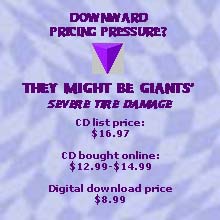|
Record stores: dead again?
|
 |
May 2, 1999: 1:54 p.m. ET
Will digital delivery of music spell doom for the brick-'n-mortar retailer?
|
NEW YORK (CNNfn) - Music retailers banking on a future had better learn to thrive on competition or plan for retirement.
That's because experts say they're going to be losing market share and fighting harder than ever to keep what remains thanks to the advent of digital distribution over the Internet -- or what's touted as the "MP3 Revolution."
MP3 software and products like it compress large audio files so they can be put on the Internet, allowing people to quickly download songs from the Web onto their computers.
Championed by that fertile base of music loyalists - college kids - MP3 technology has taken the Internet and the music industry by storm.
"Players that aren't (on the Internet) already with both feet are going to get burned pretty badly," said Andy Atherton of the music site Internet Underground Music Archive (IUMA).
Not that brick-and-mortar record stores are strangers to the rough-and-tumble world of retailing.
A turf war fueled by flat sales, competition from burgeoning chains and price undercutting by discounters like Best Buy resulted in a slew of bankruptcies in the mid-1990s.
Then came a new competitor: Internet retailers such as CDNow and that powerful "hybrid" seller Amazon.com.
But the ability to stream music over the Internet for little or no cost is opening the floodgates to retailing even wider. And the contenders entering the ring range from music novices such as the founder of MP3.com to music labels themselves.
Of ants and elephants
Analyst Dennis McAlpine of Ryan, Beck & Co. said that at this stage, talking about the effect of digital distribution on traditional retailers is like talking about the "ant attacking the elephant."
And indeed, to date the market share of online music sales is negligible. But it won't stay that way for long.

In 1998, music purchased over the Internet accounted for just 1.1 percent of all music sales -- a small number but almost four times the 0.3 percent share registered in 1997, according to the Recording Industry Association of America (RIAA).
And the industry recognizes that when high-speed, broadband connections to the Internet become the norm, digital delivery will become a major music distribution form.
A recent industry study by IUMA projects that by 2007 - a mere eight years from now - 37 percent of music revenue share will come from Internet sales, and 20 percent of those will result from purchases of digitally distributed music.
So while the effect on the traditional retailer may not appear immediate, the pressure is on to strategize now because those who don't will likely find themselves without a business.
Tapping a bigger market
That's the bad news.
The good news is that digital distribution is expected to do for music what the Internet has done for books: expand the market.
Alternative distribution channels "usually make the pot larger, because more people become interested in music again," said Marcia Appel, a spokeswoman for leading entertainment retailer Musicland (MLG), which will launch its online store in a few months, going head to head on the Web with other big retailers such as Tower Records.
And indeed, according to data compiled by RIAA and IUMA, overall U.S. music revenues are projected to grow from roughly $13.1 billion in 1999 to $19 billion in 2007.
But the number of competitors drawing from that revenue-rich future is also on the rise. And their pricing models are anyone's guess.

"No one's figured out what the pricing scheme is going to be," said Michael Nathanson, an analyst with Sanford C. Bernstein, who notes songs delivered digitally can be sold any number of ways, such as on a subscription basis or as singles. And those methods may well cut into sales of whole albums.
The Internet, Nathanson said, is a "great democratic tool when it comes to pricing," but if online prices are cut, "that's not a good thing" for retailers.
Digital delivery could drive prices lower for several reasons, among them reduced distribution costs, minimal overhead and no packaging.
Not everyone agrees that prices will drop, but Atherton sees declines of 30 to 40 percent for an album's worth of content delivered digitally.
Which will spell trouble for the store on Main Street.
As it is, online sales and large discount merchandisers have already put the squeeze on small stores.
Bill Wisener, owner of Bill's Records in suburban Dallas, said overhead costs and shoplifting-related losses prevent him from making money off new-release CDs, so it hurts when a Best Buy retails albums for what Wisener pays wholesale.
Biting the hand that feeds
And it will hurt even more if the record label that produced the CD undercuts him in other ways.
The "MP3 revolution," which has spawned countless sites offering free music without regard to copyright or royalty payments, has pushed music labels to join forces with technology companies to develop an anti-piracy standard by which to deliver songs over the Net.
But it has also encouraged labels to go direct to the consumer on the Web. Seagram's (VO) Universal Music unit, the world's No. 1 music company, and Bertelsmann's BMG Entertainment, recently agreed to launch an online store and several promotional sites together.
While most in the recording industry say they have no intention of cutting off traditional retailers, their ambitions for their online business are hardly modest.
"It's our goal to be the No. 1 destination on the Net. And we think we can achieve that very rapidly because we are, respectively, in the U.S. market, the No. 1 and No. 2 companies here," BMG Entertainment's CEO Strauss Zelnick recently told CNN's "Moneyline News Hour With Lou Dobbs" about the deal with Universal.
Not surprisingly, the prospect of record companies entering retailing has caused concern among merchandisers and analysts.
"By its nature, (digital distribution) is retailing, and (the record companies) don't have a history of that," said Jim Donio, vice president of communications at the National Association of Recording Merchandisers (NARM).
What's more, said McAlpine of Ryan, Beck, while record companies might add digital delivery to their distribution chain, they would be "cutting off their nose to spite their face" if they chose to compete with already well-established distribution channels.
According to IUMA, in a business environment driven by the Internet, the major labels, physical distributors and brick-and-mortar retailers stand to lose the most compared with independent labels and artists.
So the best route, some suggest, is a cooperative one.
With everybody's business models up in the air and customer trends in question, labels and retailers might benefit most if they work together to address the threat digital delivery poses to their bottom lines.
Who will survive?
No matter which way prices go or how many players enter the fray, one thing is certain: Jack the Retailer had best be nimble if he's to survive.
For those with deep pockets, taking a page from Musicland's book might be wise.
According to Appel, diversification is the key to survival.
She said that 15 years ago, music accounted for 98 percent of Musicland's business. Today, that number has fallen to 40 percent as the company has put more of a stake in selling videos, books and "trend" merchandise related to pop culture.
For those without deep pockets, the answer is trickier.
Wisener of Bill's Records is considering launching a Web site for his business, which, in addition to pop music, offers customers vintage records, imported albums and other hard-to-find music products.
He confesses to knowing little about e-commerce but says he is intrigued by the prospect of online auctions, which fetch as much $80 for items he sells for $15. But Wisener says he has no plans to hook up with a chain because they wouldn't be interested in what he sells.
Which just might help his business.
As the music market expands, analysts say, niche retailers may have a slim advantage over other brick-and-mortar competitors.
"Those who sell 'archive' product -- as opposed to 'hit' product -- will survive better than those who don't," said Nathanson.
New world, age-old problem
There will also be customer demand to see and touch what they want to hear.
Many analysts and industry players agree consumers will be loathe to part with their CDs or the shopping experience anytime soon.
"There's always a place for actual tactile shopping," said Nathanson, who nevertheless expresses serious doubts about many store retailers' prospects after 2003.
For those who do make it, their modus operandi may be different than it is today.
IUMA's Atherton envisions music stores moving to a more event-based model, whereby they provide "more of a show," and keep in stock only those CDs of high-volume artists like Madonna.
Customers interested in lower volume groups could sample their music in-store and order them via electronic kiosks.
"Retailers have to find a more compelling reason to get customers into the store," he said.
But others say that's an age-old problem, and traditional retailers will -- as they always have -- adapt to the demands of the times.
"The savviest retailers will look for a way to work with music suppliers . . . to make technology part of their business," said NARM's Donio. 
-- by staff writer Jeanne Sahadi
|
|
|
|
|
 |

|

